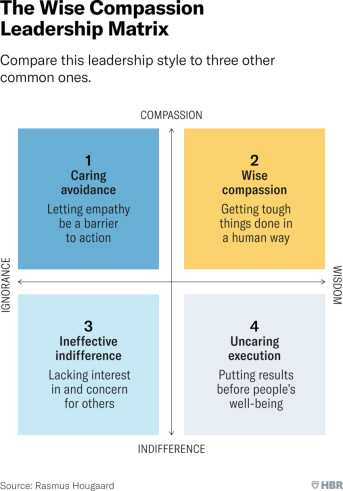
When a company is facing an unprecedentedly difficult situation, compassionate leaders can inspire great power within the company.
The compassion of a leader can build stronger connections between people, promote cooperation and mutual trust, and increase loyalty. However, compassion is not enough. To lead effectively, compassion and wisdom must be combined.

A global epidemic brought the unemployment rate to the level of the Great Depression, and the world was turbulent-from New York to Barcelona. The world we know is crumbling. The economy is down and jobs disappear. All this tests our hearts. Leaders are now needed to show compassion.
Compassion means having a positive attitude and concern for others. The compassion of a leader can build stronger connections between people, promote cooperation and mutual trust, and increase loyalty.
In addition, research has found that compassionate leaders are considered more powerful and competent.
The current difficult situation makes companies realize the greater value that caring about employees’ lives can bring. We have been researching compassion-incorporated leadership for many years and have provided training for leaders of multinational organizations to guide them in using compassion in leadership.
In the process, we discovered the key element of compassionate leadership that was ignored by many professionals in the past: compassion alone is not enough. To lead effectively, you must combine compassion and wisdom
Wisdom here refers to leadership ability, that is, an in-depth understanding of how to motivate and manage employees to reach consensus. Leadership is not easy. If you want to lead efficiently, you often need to urge the promotion process, give sharp feedback, make difficult decisions that disappoint employees, and sometimes have to fire employees.
Show compassion in leadership work, and not sacrifice wisdom and leadership efficiency. Compassion and wisdom must be balanced. Leadership that combines wisdom and compassion means to handle things strictly in a humane way.

It should be noted that these leadership styles or leadership models are not necessarily rooted in the leader’s personality characteristics, but are usually a reflection of the leader’s environment or a certain way of thinking.
Leaders in the first quadrant in the upper left of the picture care about their employees. This is good, but they tend to avoid difficult parts of leadership, such as giving sharp feedback.
Leaders in the third quadrant on the lower left are inefficient and indifferent, and are a careless leadership model. With neither compassion nor wisdom, these leaders appear cold and unprofessional in front of their subordinates.
Leaders in the fourth quadrant on the lower right are able to efficiently pursue business goals but are not sympathetic.
Leaders in the second quadrant from the upper right have both wisdom and compassion, and can achieve the best results. Leaders in this model have a good balance between caring for employees and the need to effectively promote the operation of the organization.
When drastic measures are required, these leaders will fully take care of employees’ feelings and interests.
To better understand leadership that combines wisdom and compassion, we collected data on 15,000 leaders from more than 5,000 companies in nearly 100 countries. (You can take this simple assessment to assess your compassion as a leader and help us collect data.)
We used a large amount of data to model and found a clear positive correlation between wisdom and compassion and promotion ability.
In other words, the more intelligent and compassionate the leader, the faster the promotion and the higher the position he will get. This good news fully shows that helping others is good for you.
Possible ways to cultivate wisdom and compassion
One of the most important findings we got from the data is that regular mindfulness meditation can improve wisdom and compassion.
The reason why mindfulness has such an impact on leadership style may be because mindfulness practice can increase self-awareness and become more aware of the behavior and emotions of others.
With the improvement of self-awareness and presence, leaders can more consciously use wisdom and compassion to deal with problems.
The following suggestions help to better develop a leadership style that combines compassion and wisdom. If you are already very wise but need to cultivate compassion, you can do this:
● Improve self-compassion. To have true sympathy for others, you must first have compassion for yourself. If you have a heavy burden and cannot maintain balance, it is impossible to help others find balance.
Self-compassion includes maintaining high quality sleep and paying attention to rest throughout the day. For many leaders, self-compassion means abstaining from obsessive-compulsive self-criticism.
Stop blaming yourself for things that you might have done better or might have different results. You may not criticize yourself to treat friends or colleagues who need help. Cultivate a positive way of self-talk, understand setbacks as opportunities for learning, and think about how to improve in the future.
● Adjust your mood. Get in the habit of adjusting your mood before meeting others. Put yourself in and think about the other person’s situation, and consider from their standpoint: What do I do best for this person or these people?
● Practice compassion every day. Compassion is an ability that can be trained. Our brain has amazing neuroplasticity, so the mental state you cultivate for yourself can become stronger and longer lasting.
If you already have compassion and want to improve your wisdom, you can refer to the following methods:
● Practice being honest. Leaders have the responsibility to provide the guidance employees need, even if they are against their ears. If the team members perform poorly, the leader should be honest and provide suggestions for improvement.
If you hide your concerns in order to maintain harmony, employees will neither understand your expectations nor benefit from your wisdom. Therefore, avoiding criticism is not a good way to maintain harmony.
On the contrary, it will mislead employees. Honesty is the best. Be frank.
● Direct communication once a day. If your character is more compassionate, being kind is your comfort zone. To improve your wisdom, you can try to develop a habit: communicate directly and confidently with at least one person a day. This can help you get out of your comfort zone and better develop leadership wisdom.
● Practice mindfulness every day. Research shows that practicing mindfulness meditation can help us improve leadership wisdom and ability.
There will be many difficult days in the future. A way of thinking with both wisdom and compassion is the most efficient and user-friendly way to support employees through difficult times. We face challenges together, and we all need to make difficult decisions in the future. Strive to handle difficult situations in a humane way.
Comments